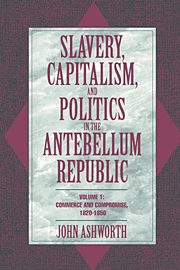Book contents
- Frontmatter
- Contents
- Preface
- Acknowledgments
- Introduction: Class conflict and the American Civil War
- Part I Context
- Part II Slavery versus capitalism
- 3 Abolitionism
- 4 The proslavery argument: Dilemmas of the master class
- Part III The second party system
- Conclusion: Economic development, class conflict and American politics, 1820–1850
- Appendix: A review of some major works on the economics of slavery
- Index
4 - The proslavery argument: Dilemmas of the master class
Published online by Cambridge University Press: 21 January 2010
- Frontmatter
- Contents
- Preface
- Acknowledgments
- Introduction: Class conflict and the American Civil War
- Part I Context
- Part II Slavery versus capitalism
- 3 Abolitionism
- 4 The proslavery argument: Dilemmas of the master class
- Part III The second party system
- Conclusion: Economic development, class conflict and American politics, 1820–1850
- Appendix: A review of some major works on the economics of slavery
- Index
Summary
Introduction
I
Under the regime that had been established in 1776 and modified by the election of Thomas Jefferson in 1800, slavery had acquired a powerful place in American politics. In the first decades of the nineteenth century, political debate was conducted between the major parties without reference to slavery and the Republicans had achieved a position of dominance within the nation as a whole. Slavery was secure not because a majority of Americans believed it good but because other issues generated real divisions within the nation along party and not sectional lines. It had thus been removed, to a considerable extent, from the political arena. The slaveholders had in Thomas Jefferson and James Madison the two most important and imposing figures in the Republican party; as we have seen, antislavery formed no part of their politics. And the election of Andrew Jackson in 1828 was in a sense a continuation of the Republican triumphs of earlier years. Like Jefferson, Jackson was at the head of what would soon be seen as an egalitarian though highly racist organization, one which would champion the rights of white men against the advocates either of “aristocratic” forms of government or of corruptly generated social and economic inequalities, while maintaining a discreet silence on the subject of slavery.
The parties which Jefferson headed and which Jackson led did not claim that slavery was a desirable institution. Indeed a striking feature of Republican and, later, Democratic political economy was the invisibility of the slave.
- Type
- Chapter
- Information
- Slavery, Capitalism, and Politics in the Antebellum Republic , pp. 192 - 286Publisher: Cambridge University PressPrint publication year: 1996



